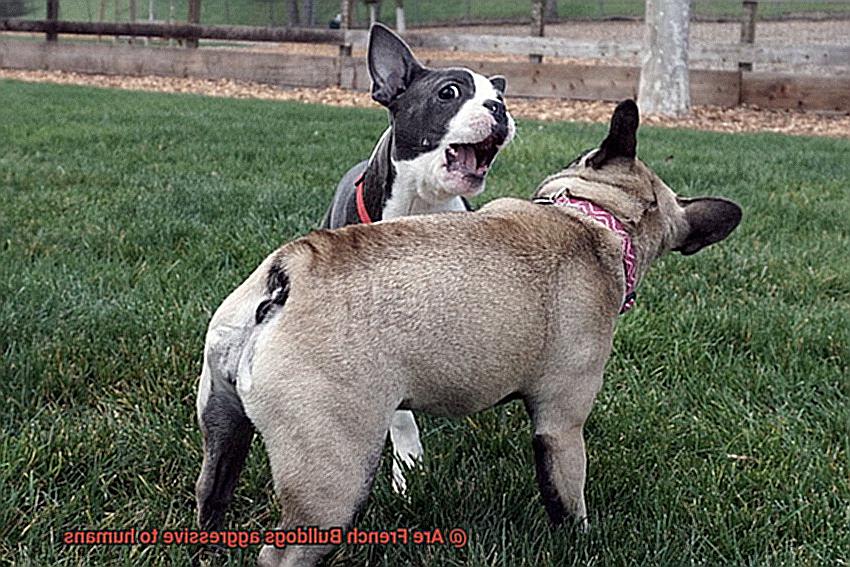Are French Bulldogs aggressive to humans?
If you’ve ever encountered a French Bulldog, then you know firsthand how their irresistible charm and adorable antics can melt even the iciest of hearts. But amidst all the cuteness, one question lingers in the minds of many: are French Bulldogs aggressive towards humans? Today, we embark on a quest to uncover the truth behind this hotly debated topic.
French Bulldogs have skyrocketed in popularity, capturing the hearts of dog lovers around the globe. However, misconceptions and stereotypes about their temperament often fuel concerns about their behavior towards humans. In this blog post, we’ll dig deep into the nature of these pint-sized wonders and separate fact from fiction.
Our journey will take us through their breed history, innate characteristics, and real-life stories shared by proud owners of Frenchies. We’ll explore factors like socialization, training, and genetics that can influence a Frenchie’s behavior towards people.
So buckle up as we dive headfirst into unraveling whether French Bulldogs truly possess aggression towards humans or if their reputation as affectionate companions outweighs any hidden tendencies. Get ready to challenge preconceived notions and discover the captivating world of French Bulldog behavior.
By the end of this blog post, you’ll be armed with a comprehensive understanding of how French Bulldogs interact with humans – empowering you to make informed decisions and forge everlasting bonds with these unique canine companions.
Let’s embark on this adventure together and unlock the secrets hidden within those adorable eyes and lovable snorts. Get ready to have your mind blown.
Understanding the Nature of French Bulldogs
Contents
- 1 Understanding the Nature of French Bulldogs
- 2 Common Causes of Aggression in French Bulldogs
- 3 Fear and Anxiety as a Cause of Aggression in French Bulldogs
- 4 Improper Training and Lack of Discipline as a Cause of Aggression in French Bulldogs
- 5 The Role of Genetics in French Bulldog Aggression
- 6 How to Address and Manage Aggressive Behavior in French Bulldogs
- 7 Professional Help for Dealing with French Bulldog Aggression
- 8 Prioritizing Proper Socialization, Training, and Environment for French Bulldogs
- 9 Conclusion
French Bulldogs are beloved companions known for their friendly and affectionate nature. Despite their small size, they have big personalities and make excellent family pets. In this article, we will delve into the nature of French Bulldogs and how their behavior can be positively shaped through proper care, training, and socialization.
Friendly and Playful Personalities:
French Bulldogs are naturally sociable and enjoy human company. They thrive on attention and affection from their owners, seeking out interactions with family members. Their patient and tolerant nature makes them ideal companions for children of all ages.
Pleasers by Nature:
French Bulldogs have an innate desire to please their owners, contributing to their friendly and non-aggressive behavior. They are eager to be part of the family and will go above and beyond to make their owners happy.
The Importance of Proper Care:
Providing proper care is crucial in shaping a French Bulldog’s behavior. This includes regular exercise to keep them physically and mentally stimulated, a nutritious diet tailored to their needs, and regular veterinary check-ups to ensure their overall health and well-being.
Training for Good Behavior:
Consistent and positive reinforcement training is key in shaping a French Bulldog’s behavior. Teaching basic commands such as sit, stay, and come helps establish boundaries and promotes good behavior. Reward-based training methods work best for French Bulldogs, as they respond well to praise and treats.
Early Socialization:
Early socialization is vital in ensuring a French Bulldog grows up to be well-behaved and non-aggressive. Exposing them to different environments, people, animals, sights, and sounds from a young age helps them develop confidence and adaptability. Puppy socialization classes can also be beneficial in providing controlled interactions with other dogs.
Identifying Aggression Triggers:
While French Bulldogs are generally friendly, there may be instances where aggression can occur. It is important to understand their body language and recognize signs of fear or anxiety that may trigger aggressive behavior. Providing a safe and secure environment and avoiding situations that cause discomfort can help prevent aggression.
Seeking Professional Help:
If a French Bulldog exhibits signs of aggression, it is crucial to consult with a professional dog trainer or behaviorist. They can assess the situation and provide guidance on addressing and managing the aggression effectively. With their expertise, they can develop a tailored training plan to address specific behavioral issues.
Common Causes of Aggression in French Bulldogs
As an expert on French Bulldogs, I understand the importance of addressing and managing aggression in these adorable little dogs. Aggression can be a concerning behavior, but with the right knowledge and techniques, owners can effectively address and prevent this issue. Let’s explore the most common causes of aggression in French Bulldogs:
- Fear and Anxiety: Like humans, dogs can become aggressive when they are fearful or anxious. French Bulldogs may display aggression as a way to protect themselves or communicate their discomfort. Identifying and addressing the root cause of fear or anxiety is crucial in managing their aggressive tendencies.
- Resource Guarding: French Bulldogs have a natural instinct to guard their resources, such as food, toys, or even their sleeping area. They may become territorial and aggressive when they feel that these resources are being threatened or taken away. Proper training and management techniques can help address resource guarding behavior.
- Lack of Socialization and Training: Dogs that have not been properly socialized or trained may exhibit aggression due to fear or defensive behaviors. It is important to expose French Bulldogs to different people, animals, and environments from an early age to prevent aggression from developing.
- Medical Issues: Underlying health conditions can make French Bulldogs more irritable and prone to aggressive outbursts. Regular monitoring of their health and prompt veterinary attention is essential to rule out any medical issues that could be contributing to aggression.
- Genetics: While genetics cannot be changed, proper training, socialization, and management techniques can help minimize and control aggression in French Bulldogs with a predisposition towards aggressive behavior.
By understanding these common causes of aggression in French Bulldogs, owners can take proactive steps to prevent and manage this behavior. In the next section, we will discuss potential solutions and strategies for addressing aggression in French Bulldogs, ensuring a harmonious relationship between owners and their furry companions.
Fear and Anxiety as a Cause of Aggression in French Bulldogs
French Bulldogs are known for their adorable and friendly nature, but like any other breed, they can display aggression under certain circumstances. Understanding the underlying causes of aggression is crucial to effectively address and manage this behavior. In this article, we will delve into the world of fear and anxiety as one of the leading triggers for aggression in French Bulldogs.
By shedding light on this topic, we hope to equip Frenchie owners with the knowledge and strategies needed to promote a peaceful and harmonious relationship with their furry companions.
Unveiling the Hidden Triggers:
Past traumatic experiences:
French Bulldogs that have been subjected to abuse, neglect, or harsh training methods may develop fear and anxiety towards humans. These negative experiences create a strong association between humans and potential harm, leading to defensive or aggressive behavior.
Proper socialization is paramount for all dogs, including French Bulldogs. If they are not exposed to various people, environments, and situations during their critical socialization period (around 3-14 weeks of age), they may become fearful or anxious around unfamiliar individuals.
Environmental stressors:
Certain environmental factors can contribute to fear and anxiety in French Bulldogs. Loud noises, chaotic surroundings, crowded spaces, or even changes in routine can trigger heightened stress levels. When dogs feel overwhelmed or threatened by their environment, they may resort to aggression as a means of self-protection.
Recognizing the Signs:
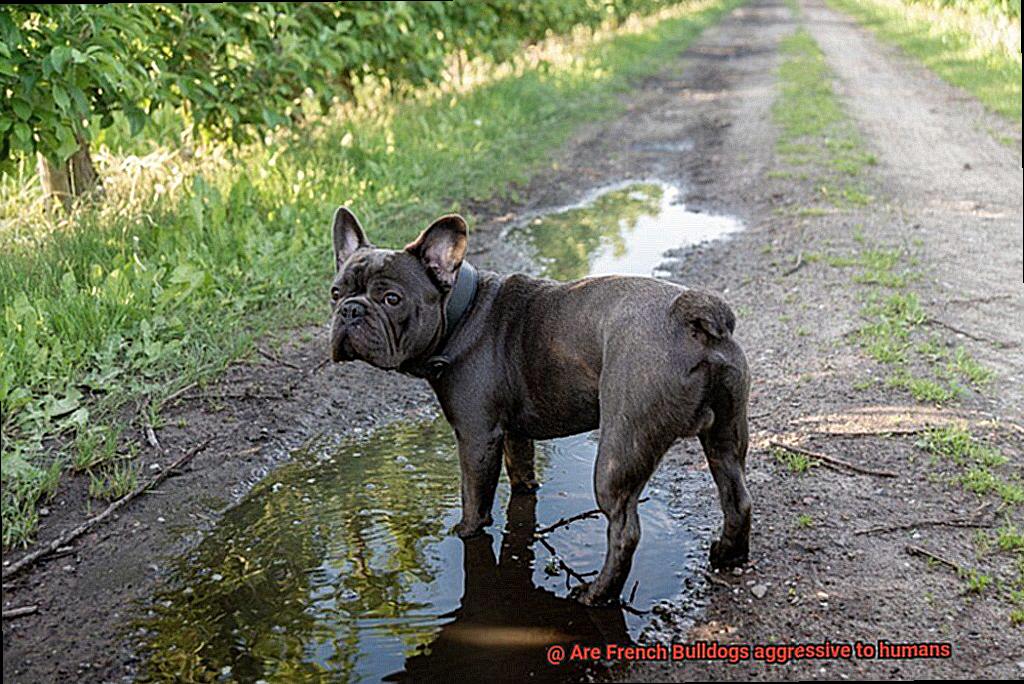
To effectively address fear and anxiety-related aggression in French Bulldogs, it is crucial for owners to be able to recognize the signs of fear and anxiety in their furry companions. These signs may include trembling, excessive panting, cowering or hiding, excessive barking or growling, pacing, excessive drooling, attempting to escape or avoid situations, and displaying defensive body language.

Strategies to Address Fear and Anxiety:
Providing a safe and secure environment:
Creating a calm and predictable environment can help reduce fear and anxiety in French Bulldogs. Ensuring a quiet space for them to retreat to, avoiding excessive noise or commotion, and maintaining a consistent routine can be helpful.
Positive reinforcement training:
Using positive reinforcement techniques, such as rewarding desired behaviors and redirecting negative behaviors, can help build trust and confidence in fearful French Bulldogs.
Gradual desensitization and counterconditioning:
Introducing fearful French Bulldogs to their triggers in a controlled and gradual manner, paired with positive experiences and rewards, can help them develop more positive associations and reduce their fear or anxiety.
Seeking professional help:
In severe cases or if the aggression persists despite efforts, it is recommended to seek guidance from a professional dog trainer or behaviorist who specializes in fear and aggression issues.
Improper Training and Lack of Discipline as a Cause of Aggression in French Bulldogs
French Bulldogs, known for their playful and affectionate nature, can sometimes display aggression towards humans if not properly trained and disciplined. In this section, we will delve into how improper training and lack of discipline can contribute to aggression in French Bulldogs. We’ll explore effective training methods, the significance of consistent discipline, and the role of positive reinforcement in shaping desirable behavior.
Establishing Leadership Through Training:
French Bulldog owners must establish themselves as the pack leader early on. By providing consistent training from an early age, owners can prevent dominant or aggressive behaviors from developing as the dog grows older. Basic obedience commands, such as “sit,” “stay,” and “come,” should be taught using positive reinforcement techniques like treats and praise. This helps create a positive association between good behavior and rewards.
Socialization Skills for a Well-Behaved Frenchie:
Training should also focus on socialization skills, ensuring that French Bulldogs are comfortable around humans. Exposing them to various environments, people, and other animals at an early age helps them develop confidence and reduces the likelihood of fear-based aggression later in life. Regular walks in different settings and controlled interactions with other dogs can aid in their social development.
Consistency is Key:
Consistency is crucial when it comes to training French Bulldogs. Clear rules and boundaries must be established and enforced consistently to avoid confusion. By adhering to a structured routine, owners can provide their Frenchies with a sense of security, helping them understand what is expected of them.
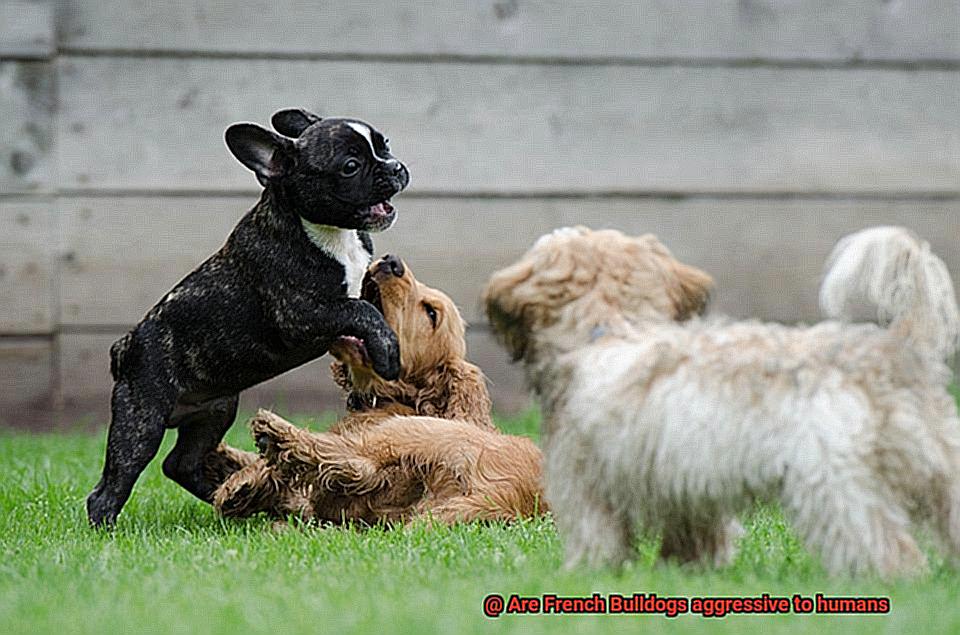
The Role of Discipline:
Lack of discipline can contribute to aggression in French Bulldogs. Allowing unwanted behaviors without consequences may create a sense of entitlement, making them prone to aggression. It is essential for owners to set boundaries and correct undesirable behaviors immediately to prevent the escalation of aggression.
Seeking Professional Assistance:
While many French Bulldogs respond well to basic training, some may require additional support. Professional obedience training classes or working with a dog trainer experienced in behavioral issues can be beneficial for owners struggling with training their furry friends. These professionals can provide guidance tailored to the specific needs of French Bulldogs.
With proper training and consistency, most French Bulldogs can be well-behaved and friendly towards humans. However, it is important to remember that each dog is unique, and some may have underlying temperament or genetic factors contributing to aggression.
In such cases, seeking the help of a professional behaviorist is recommended. By investing time and effort into training and discipline, owners can ensure their French Bulldogs lead happy, well-adjusted lives while fostering a strong bond between human and canine companions.
The Role of Genetics in French Bulldog Aggression
French Bulldogs are known for their adorable looks and friendly nature. However, some French Bulldogs may show signs of aggression towards humans. In this section, we will delve into the role of genetics in French Bulldog aggression and how it can impact our furry friends.
Breed History:
French Bulldogs have a fascinating history that dates back to their origin as bull-baiting dogs in the 1800s. These dogs were bred to be fearless and tenacious, which required a certain level of aggression. While modern French Bulldogs no longer participate in such activities, the genetic predisposition for aggression may still be present in some individuals.
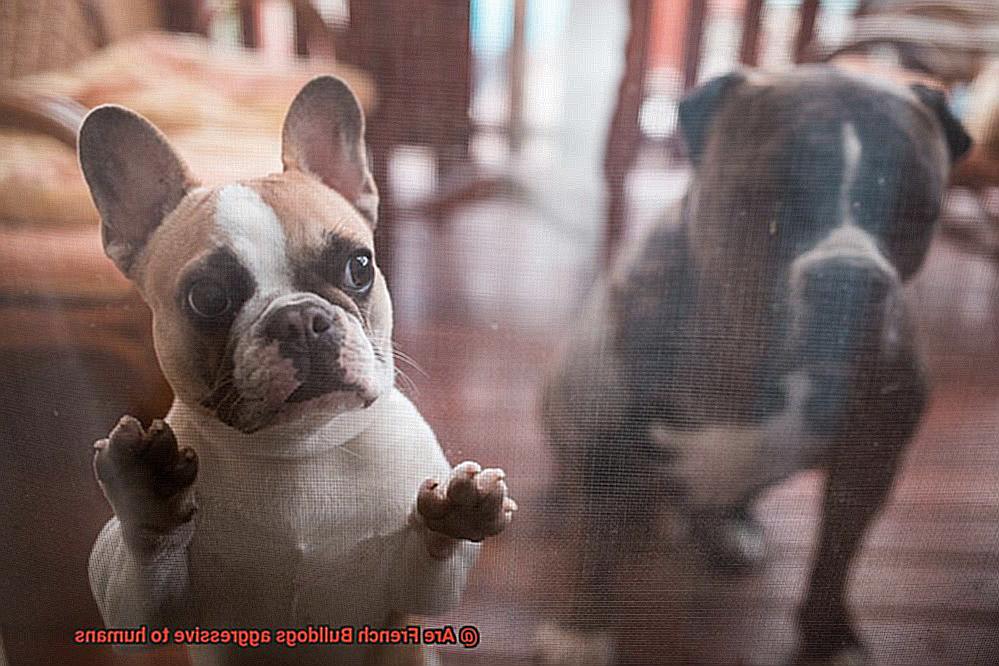
Lineage Matters:
Just like humans, dogs inherit traits from their parents. If a French Bulldog comes from a line of aggressive or poorly bred dogs, there is a higher likelihood that they may display aggressive behaviors. Responsible breeders strive to select dogs with good temperaments and breed out any aggression, but unfortunately, not all breeders adhere to this standard.
Health Issues and Aggression:
Certain genetic disorders or health issues can also contribute to aggression in French Bulldogs. Neurological conditions or imbalances in brain chemistry can affect a dog’s behavior and potentially lead to aggression. It is crucial for owners to be aware of any underlying health problems that may contribute to their French Bulldog’s aggression and seek appropriate veterinary care.
Nature vs. Nurture:
While genetics can predispose a French Bulldog to aggression, it is important to note that other factors such as environment and socialization also play a significant role. Even if a French Bulldog has a genetic predisposition for aggression, proper training, socialization, and a nurturing environment can help mitigate these tendencies.
Training and Socialization Tips:
- Start early: Begin socializing your French Bulldog from an early age to expose them to different people, animals, and environments.
- Positive reinforcement: Use rewards and praise to encourage good behavior and discourage aggression.
- Consistency is key: Establish clear rules and boundaries, and consistently enforce them to ensure your French Bulldog understands what is expected of them.
- Seek professional help: If you’re struggling with your French Bulldog’s aggression, don’t hesitate to consult a professional dog trainer or behaviorist who can provide guidance tailored to your specific situation.
How to Address and Manage Aggressive Behavior in French Bulldogs
French Bulldogs are known for their friendly and affectionate nature, but like any dog breed, they can display aggressive behavior. In this blog post, we will explore how to address and manage aggression in French Bulldogs to ensure the safety and well-being of both the dog and its owners.
Understanding the Root Cause:
Aggression in French Bulldogs can stem from various factors, such as fear, anxiety, territoriality, possessiveness, or even pain. Identifying the underlying cause is crucial in developing an effective management plan. If you notice signs of aggression in your French Bulldog, consult with a certified dog behaviorist or trainer to assess the situation and provide customized solutions.
Consistency and Positive Reinforcement:
Consistency is key when addressing aggression in French Bulldogs. Establish clear rules and boundaries for your dog and ensure that all family members follow them consistently. Additionally, positive reinforcement plays a crucial role in shaping desired behaviors. Reward your French Bulldog with treats, praise, and affection when they display good behavior, as this reinforces positive associations and encourages them to make better choices.
Socialization for a Well-Balanced Dog:
Socialization is a vital aspect of managing aggression in French Bulldogs. Expose your dog to different people, animals, and environments from an early age to reduce fear and anxiety triggers. Gradually introduce new experiences while rewarding calm behavior to build their confidence and improve their overall temperament.
Avoid Punishment-Based Training Methods:
Punishment-based training methods should be avoided when dealing with aggression in French Bulldogs. Physical or verbal punishment can escalate aggression and damage the trust between you and your dog. Instead, redirect their attention towards more appropriate behaviors and reward them for making positive choices.
Implement a Structured Routine:
Implementing a structured routine can help manage aggressive behavior in French Bulldogs. Regular exercise, mental stimulation, and a consistent daily schedule can alleviate stress and prevent boredom-related aggression. Ensure that your French Bulldog receives adequate physical and mental stimulation to keep them happy and well-balanced.
Professional Help for Dealing with French Bulldog Aggression
Owning a French Bulldog can bring immense joy and companionship, but sometimes, aggression issues can arise. Dealing with aggression in French Bulldogs requires professional help to ensure the safety of your family, friends, and furry companion. In this blog post, we will explore why seeking professional assistance is crucial in addressing French Bulldog aggression and provide insights based on first-hand knowledge and experiences.
Why Seek Professional Help?
Expertise and Experience:
Professional dog behaviorists and trainers specialize in aggression cases and possess the knowledge and experience to assess and address aggressive behaviors. Their expertise helps identify the underlying causes of aggression in your French Bulldog, be it genetic predisposition, inadequate socialization, improper training, or environmental factors.
Thorough Evaluation:
A professional will conduct a comprehensive evaluation of your French Bulldog’s behavior, history, and environment. This assessment helps them understand the triggers and patterns of aggression displayed by your dog. By asking detailed questions about your dog’s routine, interactions, and previous incidents of aggression, they gain valuable insights to develop a customized training plan.
Tailored Training Plan:
Based on the evaluation, a behaviorist or trainer will create a training plan that focuses on addressing your French Bulldog’s specific triggers and aggressive behaviors. This plan may include obedience training, behavior modification techniques, and management strategies to effectively tackle the aggression issue.
Patience and Commitment:
Resolving aggression issues takes time and consistency. Working with a professional ensures you receive guidance throughout the process and ongoing support to implement the training plan correctly. With their help, you can make progress in modifying your French Bulldog’s aggressive behavior.
Medication as an Option:
In some cases, medication may be prescribed to manage underlying anxiety or fear-based aggression in French Bulldogs. A qualified veterinarian should always prescribe and monitor the medication. It can complement the training plan by helping the dog become more receptive to behavior modification techniques.
Preventive Measures:
While seeking professional help is essential, preventing aggression in French Bulldogs is equally important. Here are some preventive measures to consider:
- Early socialization: Expose your French Bulldog to various people, animals, and environments from a young age to promote positive interactions and reduce fear-based aggression.
- Positive reinforcement training: Use reward-based training methods to teach your dog appropriate behaviors and reinforce good manners.
- Consistent boundaries: Establish consistent rules and boundaries for your French Bulldog to create a sense of structure and security.
- Mental and physical stimulation: Provide regular mental and physical exercise to keep your dog mentally engaged and prevent pent-up energy that can lead to frustration and aggression.
Prioritizing Proper Socialization, Training, and Environment for French Bulldogs
Like any other breed, they can exhibit aggression towards humans if not properly socialized, trained, and provided with a suitable environment. In this article, we’ll explore why prioritizing these aspects is crucial in preventing aggression and promoting a harmonious relationship between French Bulldogs and their owners.
Socialization:
Proper socialization is the foundation for a well-adjusted and friendly French Bulldog. Here’s why it’s so important:
- Expose your French Bulldog to different people, environments, and situations from an early age to help them develop positive behaviors and attitudes towards humans.
- Encourage positive interactions with strangers, children, and other animals to prevent fear-based aggression.
- Gradually introduce your Frenchie to new experiences, such as car rides, grooming sessions, and visits to the veterinarian, ensuring they associate them with positive outcomes.
Training:
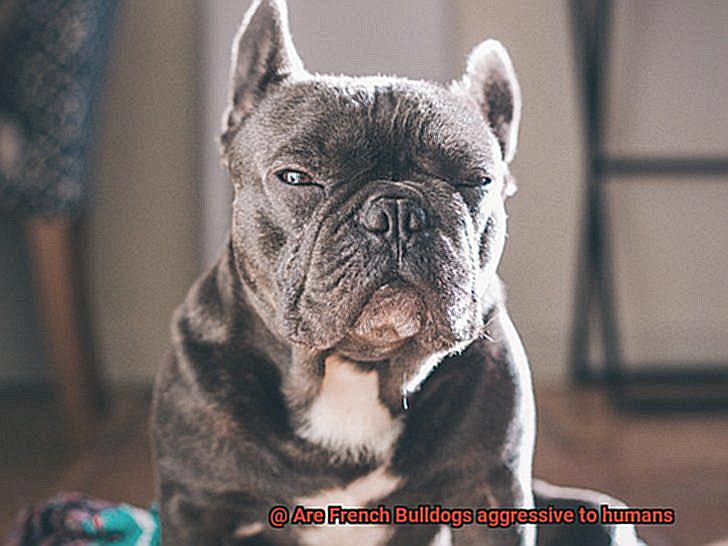
Obedience training is essential for preventing aggression in French Bulldogs. Here are some training tips:
- Start training early using positive reinforcement techniques like treats, praise, and play.
- Teach basic commands like sit, stay, come, and leave it to establish a clear hierarchy where your Frenchie understands that humans are in charge.
- Redirect any potential aggressive behaviors into more acceptable actions through consistent training.
Suitable Environment:
Creating a conducive environment for your French Bulldog is vital for their well-being and behavior towards humans:
- Provide a comfortable living space with access to fresh air, natural light, and appropriate temperature levels.
- Ensure your Frenchie gets sufficient exercise and mental stimulation to prevent boredom and frustration that can lead to aggressive behavior.
- Avoid leaving your Frenchie alone for extended periods as this can contribute to separation anxiety and subsequent aggression.
Genetic Considerations:
While socialization, training, and environment play significant roles in preventing aggression, genetics also play a part. Therefore, it’s essential to choose a reputable breeder who focuses on breeding French Bulldogs with good temperaments.
Regular Veterinary Check-ups:
Regular vet check-ups will help identify any underlying health issues that may contribute to aggressive behaviors. Ensure your Frenchie is up-to-date on vaccinations and receives appropriate medical care.
U9FfZtV10_Y” >
Conclusion
In conclusion, it is important to note that French Bulldogs are generally not aggressive towards humans. They are known for their friendly and affectionate nature, making them great companions for families and individuals alike. While every dog is unique and may have their own personality traits, aggression towards humans is not a characteristic commonly associated with this breed.
French Bulldogs are often described as being social and loving, enjoying the company of their human family members. They thrive on attention and affection, always seeking to be by your side. Their small size and gentle demeanor make them well-suited for households with children or elderly individuals.
It is crucial to remember that proper training and socialization play a significant role in shaping a dog’s behavior. By providing consistent discipline, positive reinforcement, and exposing them to various situations from an early age, you can help ensure that your French Bulldog grows up to be a well-behaved and non-aggressive pet.
While any dog has the potential for aggression if mistreated or provoked, instances of French Bulldogs displaying aggressive behavior towards humans are relatively rare. It is essential to treat these dogs with love, respect, and kindness to foster a strong bond built on trust.
In summary, French Bulldogs are generally not aggressive towards humans but rather known for their friendly nature.
